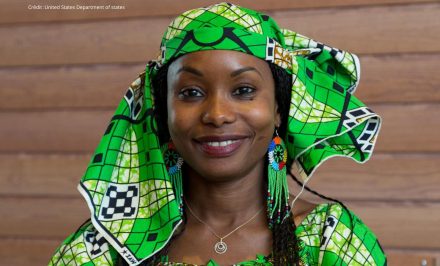 Cameroon : Dr. Yasmine Ndassa, the research scientist turned data storyteller
Cameroon : Dr. Yasmine Ndassa, the research scientist turned data storyteller
 Julien Ngum Che : advocating for the rights of displaced women and youth in Cameroon
Julien Ngum Che : advocating for the rights of displaced women and youth in Cameroon
 Chilufya Mutale Mwila, the Zambian entrepreneur driving financial inclusion across Africa
Chilufya Mutale Mwila, the Zambian entrepreneur driving financial inclusion across Africa
 Wangari Muchiri, the Kenyan engineer committed to accelerating the ecological transition in Africa
Wangari Muchiri, the Kenyan engineer committed to accelerating the ecological transition in Africa


Chadian geographer and environmental activist, Hindou Oumarou Ibrahim is committed to defending the rights of Chad’s indigenous peoples, who are struggling with the effects of climate change.
For more than twenty years, Hindou Oumarou Ibrahim has been advocating for the rights of the Mbororo nomadic community, known for raising livestock in the Lake Chad region for thousands of years. Today, they are facing the consequences of climate change, including the drying up of Lake Chad and the degradation of pastures… A situation that is causing conflicts between herders and farmers in the region.
In 1999, at just 15 years old, she founded the Association of Indigenous Peul Women of Chad (AFPAT) to defend the rights of Chad’s Indigenous peoples and promote their inclusion in the global movement to fight against the effects of climate change.
Through this association, she has been working for years to bring together the Indigenous community to collectively face challenges and address shared concerns. In recent years, she has provided solutions to these populations, including, among other things, participatory mapping of natural resources by Indigenous people. This initiative has helped reduce tensions between communities and assisted local authorities in better managing natural resources.
Thanks to these efforts, the association took part in international climate negotiations, highlighting the work accomplished by Hindou Oumarou as well as her commitment in Chad. In 2015, she was appointed co-chair of the International Indigenous Peoples’ Forum on Climate Change during COP21 in Paris. She also served as co-director of the Indigenous Peoples’ Global Initiative Pavilion at COP21, COP22, and COP23.
Today, she holds multiple positions. She is a member of the scientific and technical committee of the BIOspheres and Heritage of Lake Chad (BIOPALT) project, president of the FSC Indigenous Foundation Council, coordinator of the Association of Fulani Women and Indigenous Peoples of Chad, and coordinator of the Indigenous Peoples of Africa Coordinating Committee (IPACC).
Today, she holds multiple positions. She is a member of the scientific and technical committee of the BIOspheres and Heritage of Lake Chad (BIOPALT) project, president of the FSC Indigenous Foundation Council, coordinator of the Association of Fulani Women and Indigenous Peoples of Chad, and coordinator of the Indigenous Peoples of Africa Coordinating Committee (IPACC).
In 2017, she was named an “Explorer of Solutions” by National Geographic. She was also included in the BBC’s 100 Women 2018 ranking. In 2019, she won the Pritzker Emerging Environmental Genius Award, as well as the Rolex Award in 2021, a recognition given to individuals who have had the courage and conviction to tackle major and beneficial challenges. She was also ranked among the 100 most influential African women by Avance Media in the same year.